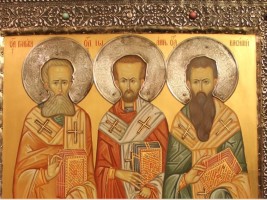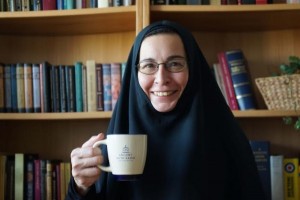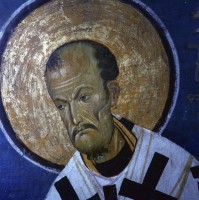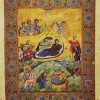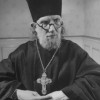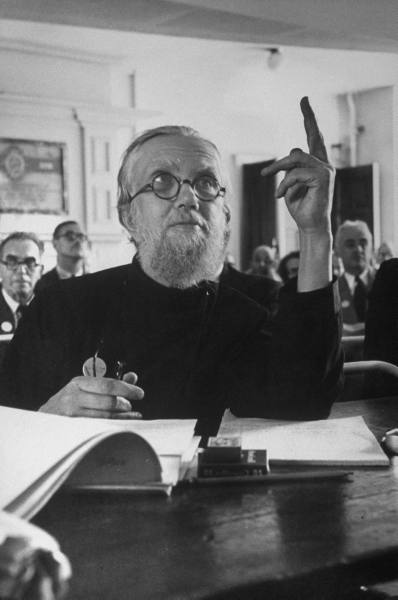
Protopresbyter Georges Florovsky (+1979)
CHRYSOSTOM was a powerful preacher. He was fond of preaching, and regarded preaching as the duty of a Christian minister. Priesthood is authority, but it is authority of word and conviction. This is the distinctive mark of Christian power. Kings compel, and pastors convince. The former act by orders, the latter by exhortations. Pastors appeal to human freedom, to human will and call for decisions. As Chrysostom used to say himself, “We have to accomplish the salvation of men by word, meekness, and exhortation.” The whole meaning of human life for Chrysostom was in that it was, and had to be, a life in freedom, and therefore a life of service. In his preaching he spoke persistently about freedom and decision. Freedom was for him an image of God in man. Christ came, as Chrysostom used to remind, precisely to heal the will of man. God always acts in such a way as not to destroy our own freedom. God Himself acts by calls and exhortations, not by compulsion. He shows the right way, calls and invites, and warns against the dangers of wickedness, but does not constrain. Christian pastors must act accordingly. By temperament, Chrysostom was rather a maximalist, sharp and rigoristic, but he was always against compulsion, even in the struggle with heretics. Christians are forbidden, he used to insist, to apply violence even for good aims: “Our warfare does not make the living dead, but rather makes the dead to live, because it is conducted in the spirit of meekness and humility. I persecute by word, not by acts. I persecute heresy, not heretics. It is mine more to be persecuted, than to persecute. So Christ was victorious as a Crucified, and not as a crucifier.” The strength of Christianity was for him in humility and toleration, not in power. One had to be strict about oneself, and meek to the others.
Yet, Chrysostom was in no sense a sentimental optimist. His diagnosis of the human situation was stern and grim. He lived in a time when the Church was suddenly invaded by crowds of nominal converts. He had an impression that he was preaching to the dead. He watched the lack of charity, and the complacent injustice and saw them almost in an apocalyptic perspective: “We have quenched the zeal, and the body of Christ is dead.” He had an impression that he was speaking to people for whom Christianity was just a conventional fashion, an empty form, a manner and little more: “Among the thousands one can hardly find more than a hundred of them who are being saved, and even about that I am doubtful.” He was rather embarrassed by the great number of alleged Christians: “an extra food for fire.”
Prosperity was for him a danger, the worst kind of persecution, worse than an open persecution. Nobody sees dangers. Prosperity breeds carelessness. Men fall asleep, and the devil kills the sleepy. Chrysostom was disturbed especially by an open and deliberate lowering of standards and requirements, even among the clergy. Salt was losing its savour. He reacted to this not only by a word of rebuke and reprimand, but by deeds of charity and love. He was desperately concerned with the renewal of society, with the healing of social ills. He was preaching and practising charity, founding hospitals and orphanages, helping the poor and destitute. I le wanted to recover the spirit of practising love. He wanted more activity and commitment among Christians. Christianity for him was precisely “the Way,” as it had been sometimes described in Apostolic times, and Christ Himself was “the Way.” Chrysostom was always against all compromises, against the policy of appeasement and adjustment. He was a prophet of an integral Christianity.
Chrysostom was mainly a preacher of morality, but his ethics was deeply rooted in the faith. He used to interpret Scripture to his flocks, and his favorite writer was St. Paul. It was in his epistles that one could see this organic connection between faith and life. Chrysostom had his favorite dogmatic theme, to which he would constantly return first of all, the theme of the Church, closely linked to the doctrine of Redemption, being the sacrifice of the High Priest Christ; the Church is the new being, the life in Christ, and the life of Christ in men. Secondly, the theme of Eucharist, a sacrament and a sacrifice. It is but fair to call Chrysostom, as he was actually called, “the teacher of Eucharist,” doctor eucharisticus. Both themes were linked together. It was in the Eucharist, and through it, that the Church could be alive.
Chrysostom was a witness of the living faith, and for that reason his voice was so eagerly listened to, both in the East and in the West; but for him, the faith was a norm of life, and not just a theory. Dogmas must be practised. Chrysostom was preaching the Gospel of Salvation, the good tidings of the new life. He was not a preacher of independent ethics. He preached Christ, and Him crucified and risen, the Lamb and the High Priest. Right life was for him the only efficient test of right beliefs. Faith is accomplished in the deeds, the deeds of charity and love. Without love faith, contemplation, and the vision of the mysteries of God are impossible. Chrysostom was watching the desperate struggle for truth in the society of his own days. He was always concerned with living souls; he was speaking to men, to living persons. He was always addressing a flock, for which he felt responsibility. He was always discussing concrete cases and situations.
One of his constant and favorite subjects was that of wealth and misery. The theme was imposed or dictated by the setting in which Chrysostom had to work. He had to face the life in great and overcrowded cities, with all the tensions between the rich and the poor. He simply could not evade social problems without detaching Christianity from life, but social problems were for him emphatically religious and ethical problems. He was not primarily a social reformer, even if he had his own plans for Christian society. He was concerned with the ways of Christians in the world, with their duties, with their vocation.
In his sermons we find, first of all, a penetrating analysis of the social situation. He finds too much injustice, coldness, indifference, and suffering and sorrow in the society of his days. And he sees well to what extent it is connected with the acquisitive character of the contemporary society, with the acquisitive spirit of life. This acquisitive spirit breeds inequality, and therefore injustice. He is not only upset by fruitless luxury of life; he is apprehensive of wealth as a standing temptation. Wealth seduces the rich. Wealth itself has no value. It is a guise, under which the real face of man is concealed, but those who hold possessions come to cherish them, and are deceived; they come to value them and rely on them. All possessions, not only the large ones, are dangerous, in so far as man learns to rely upon what is, by its very nature, something passing and unreal.
Chrysostom is very evangelical at this point. Treasures must be gathered in heaven, and not on earth, and all earthly treasures are unreal and doomed to corruption. “A love for wealth is abnormal,” says Chrysostom. It is just a burden for the soul, and a dangerous burden. It enslaves the soul; it distracts it from the service to God. The Christian spirit is a spirit of renunciation, and wealth ties man to inanimate things. The acquisitive spirit distorts the vision, perverts the perspective. Chrysostom is closely following the injunctions of the Sermon on the Mount. “Do not be anxious for your life, what you shall eat, nor for your body, what you shall put on. . .” Life is greater than clothing or food, but it is anxiety which is the prevailing temper of the acquisitive society.
Christians are called to renounce all possessions and to follow Christ in full confidence and trust. Possessions can be justified only by their use: feed the hungry, help the poor, and give everything to the needy. Here is the main tension, and the main conflict, between the spirit of the Church and the mood of the worldly society. The cruel injustice of actual life is the bleeding wound of this society. In a world of sorrow and need, all possessions are wrong–they are just proofs of coldness, and symptoms of little faith. Chrysostom goes so far as to denounce even the splendor of the temples. “The Church,” he says, “is a triumphant company of angels, and not a shop of a silversmith. The Church claims human souls, and only for the sake of the souls does God accept any other gifts. The cup which Christ offered to the disciples at the Last Supper was not made of gold. Yet it was precious above all measure. If you want to honor Christ, do it when you see Him naked, in the person of the poor. No use, if you bring silk and precious metals to the temple, and leave Christ to suffer cold and nakedness in the outside. No use, if the temple is full of golden vessels, but Christ himself is starving. You make golden chalices, but fail to offer cups of cold water to the needy. Christ, as a homeless stranger, is wandering around and begging, and instead of receiving Him you make decorations.”
Chrysostom was afraid that everything kept aside was in a sense stolen from the poor. One cannot be rich, except at the cost of keeping others poor. The root of wealth is always in sortie injustice. Yet, poverty was not for Chrysostom just a virtue by itself. Poverty meant for him first of all need and want, and suffering and pain. For this reason Christ can be found among the poor, and he comes to us in the guise of a beggar, and not in that of a rich man. Poverty is a blessing only when it is cheerfully accepted for Christ’s sake. The poor have less anxiety than the rich and are more independent-or at least may be. Chrysostom was fully aware that poverty can be tempting too, not only as a burden, but as an incentive of envy or despair. For that very reason he wanted to fight poverty, in order not only to ease the suffering, but to remove temptations also.
Chrysostom was always concerned with ethical issues. He had his own vision of a just society, and the first prerequisite was, in his opinion, equality. It is the first claim of any genuine love. But Chrysostom would go much further. He felt that there was but one owner of all things in the world-God Himself, the Maker of all. Strictly speaking, no private property should exist at all. Everything belongs to God. Everything is loaned rather than given by God in trust to man, for God’s purposes. Chrysostom would add: Everything is God’s except the good deeds of man–it is the only thing that man can own. As everything belongs to God, our common Master, everything is given for common use. Is it not true even of worldly things? Cities, market-places, streets-are they not a common possession? God’s economy is of the same kind. Water, air, sun and moon, and the rest of creation, are intended for common use. Quarrels begin usually when people attempt to appropriate things which, by their very nature, were not intended for the private possession of some, to the exclusion of others.
Chrysostom had serious doubts about private property. Does not strife begin when the cold distinction mine” and “thine” is first introduced? Chrysostom was concerned not so much with the results, as with causes-with the orientation of the will. Where is man going to gather his treasures? Chrysostom was after justice in defense of human dignity. Was not every man created in God’s image? Did God not wish salvation and conversion of every single man, regardless of his position in life, and even regardless of his behavior in the past? All are called to repentance, and all can repent. There was, however, no neglect of material things in his preaching. Material goods come also from God, and they are not bad in themselves. What is bad, is only the unjust use of goods, to the profit of some, while others are left starving. The answer is in love. Love is not selfish, “is not ambitious, is not self-seeking.” Chrysostom was looking back to the primitive Church. “Observe the increase of piety. They cast away their riches, and rejoiced, and had great gladness, for greater were the riches they received without labor. None reproached, none envied, none grudged; no pride, no contempt. No talk of ‘mine’ and ‘thine.’ Hence gladness waited at their table; no one seemed to eat of his own, or another’s. Neither did they consider their brethren’s property foreign to themselves; it was a property of the Master; nor again deemed they ought their own, all was the brethren’s.” How was this possible, Chrysostom asks: By the inspiration of love, in recognition of the unfathomable love of God.
In no sense was Chrysostom preaching “communism.” The pattern itself may be deceitful and misleading as any other. The real thing is the spirit. What Chrysostom was preaching in the cities, monks were fervently practising in their communities, professing by deeds that God was the only Master and owner of everything. Chrysostom did not regard monastic life just as an advanced course for the select, but rather as a normal evangelical pattern intended for all Christian. At this point he was in full agreement with the main tradition of the early Church, from St. Basil and St. Augustine up to St. Theodore of Studium in the later times. But the strength of monasticism is not in the pattern itself, but in the spirit of dedication, in the choice of a “higher calling.” Was this calling only for the few? Chrysostom was always suspicious of inequality. Was it not dangerous to discriminate between the “strong” and the “weak”? Who could judge and decide in advance? Chrysostom was always thinking about real men. There was some kind of individualism inherent in his approach to people, but he valued unanimity most highly–the spirit of solidarity, of common care and responsibility, the spirit of service. No person can grow in virtue, unless he serves his brethren. For that reason he always emphasized charity. Those who fail to do charity will be left outside the bridal chamber of Christ. It is not enough, he says, to lift our hands to heaven-stretch them to the needy, and then you will be heard by the Father. He points out that, according to the Parable of the Last Judgment, the only question which will be asked then, is that about charity. But again it was not just a moralism with him. His ethics had an obvious mystical depth. The true altar is the body of men itself. It is not enough to worship at the altars. There is another altar made of living souls, and this altar is Christ Himself, His Body. The sacrifice of righteousness and mercy should be offered on this altar too, if our offerings are to be acceptable in God’s sight. The deeds of charity had to be inspired by the ultimate dedication and devotion to Christ, who came into the world to relieve all want, and sorrow, and pain.
Chrysostom did not believe in abstract schemes; he had a fiery faith in the creative power of Christian love. It was for that reason that he became the teacher and prophet for all ages in the Church. In his youth he spent some few years in the desert, but would not stay there. For him monastic solitude was just a training period. He returned to the world to proclaim the power of the Gospel. He was a missionary by vocation; he had an apostolic and evangelistic zeal. He wanted to share his inspiration with his brethren ‘ He wanted to work for the establishment of God’s Kingdom. He prayed for such things in common life so that nobody would need to retire to the wilderness in search for perfection, because there would be the same opportunity in the cities. He wanted to reform the city itself, and for that purpose lie chose for himself the way of priesthood and apostolate.
Was this a utopian dream? Was it possible to reshape the world, and to overrule the wordliness of the world? Was Chrysostom successful in his mission? His life was stormy and hard, it was a life of endurance and martyrdom. He was persecuted and rejected not by the heathen, but by false brethren, and died homeless as a prisoner in exile. All he was given to endure he accepted in the spirit of joy, as from the hand of Christ, Who was Himself rejected and executed. The Church gratefully recognized that witness and solemnly acclaimed Chrysostom as one of the “ecumenical teachers” for all ages to come.
There is some unusual flavor of modernity in the writings of Chrysostom. His world was like ours, a world of tensions, a world of unresolved problems in all walks of life. His advice may appeal to our age no less than it did to his own. But his main advice is a call to integral Christianity, in which faith and charity, belief and practice, are organically linked in an unconditional surrender of man to God’s overwhelming love, in an unconditional trust in His mercy, in an unconditional commitment to His service, through Jesus Christ, our Lord.
From Volume Four of “Collected Works: Aspects of Church History”
This article originally appeared in St. Vladimir’s Seminary Quarterly, IV, Nos. 3/4 (1955), 37-42.












